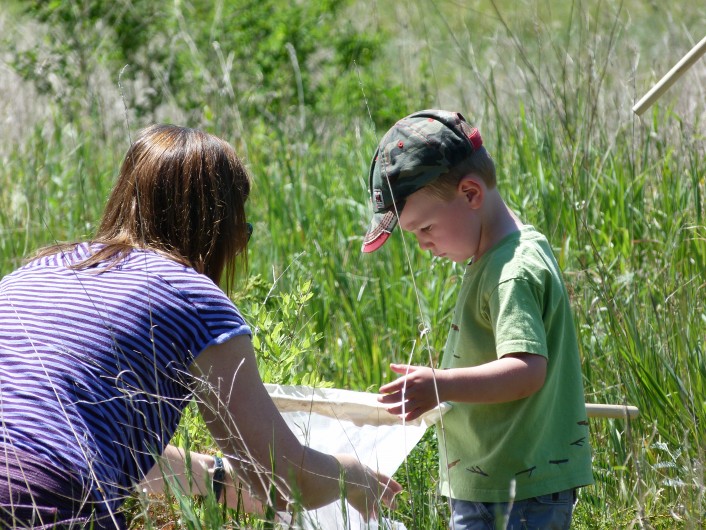Our most memorable childhood experiences, those that shape us, take place in the company of a trusted adult. Given the highly protective, restrictive nature of children’s outdoor experiences in today’s world, the presence of an involved adult is key. In essence, these adults act as the gatekeepers of children’s access to the natural world.
“The way children see — or don’t see — themselves in relation to nature is going to have profound effects on the kind of world we will all live in.” — B. Griswold, the Nature Conservancy
How can parents (and grandparents) act as mentors for the next generation of naturalists? It’s easier than you think.
Grow a garden. It doesn’t need to be large or elaborate. A small plot of earth where a child can “muck about” and grow a few beans or a squash is worthwhile. Even planting and growing strawberries or tomatoes in pots on a deck or balcony can help us develop a connection to the Earth and to our food.
Study local wildlife. A bird feeder in the yard will draw in a variety of birds and small animals. It also provides the opportunity to wonder, then seek answers: What is that bird? Why are some squirrels grey?
Stop and smell the roses, or violets, or trilliums. Engage your sense of observation in the outdoors every day. Identify the local weeds and wildflowers. Choose to grow native plants in your gardens.
Go bug-eyed. Work to identify the insects and spiders you see in your everyday world. Learn what ones are feared and what ones are our friends. (Hint: Most are the good guys.) Consider keeping a creepy-crawly as a temporary pet. The book Caterpillars: Find. Identify. Raise Your Own, by Chris Earley, is an excellent resource.
Play in the water. A clear glass or plastic jar, a dollar-store aquarium net and a sunny afternoon by a lake, river or pond will bring hours of low-cost fun and learning. I firmly believe every child should have the opportunity to catch — and release — a frog before the age of 10.
Walk more places. Walking allows us to observe our surroundings rather than whizzing by them in our closed-up vehicles. Family walks encourage conversation and observation. Did you see that? Can you hear that? What is that smell?
Develop a love for eating outside. Plan to eat dinner at the picnic table in your backyard at least once a week. Pack a picnic to take on your travels, rather than hitting the drive-through. Keep an old blanket or quilt in your vehicle for an impromptu tablecloth on a park picnic table or toss it on the ground and eat au naturel. Food really does taste better when eaten outside.
Watch the stars or sleep outside. There is something special about being outside in the quiet after dark. This can be as simple as being on a blanket on the grass while watching the stars in your pyjamas before heading indoors to bed.
For young children, the most seemingly insignificant things — a coloured leaf in autumn, an acorn cap, a tadpole in a pond, a squirrel way up in the branches — become significant and wonderful when they have an important adult to share in the joy of new discoveries and new knowledge of nature.
No matter how old our birth records say we are, there is a lot of child left in each of us. Embrace that child and allow yourself see nature for the first time, all over again. One day, your children will thank you for this gift. (Thanks, Mom, Dad and Grandma B.)
Written by Julia Wolst, Education Coordinator.

